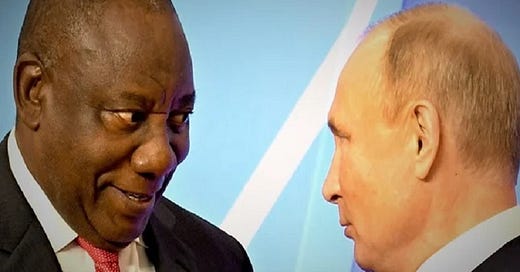The larger context in which South Africa just flipflopped on its “International Criminal Court” commitments is of outsized importance not just for BRICS’ future, but by extrapolation, also for the emerging Multipolar World Order as well due to that group’s function as the engine of financial multipolarity.
South Africa’s recent flipflopping on its membership in the “International Criminal Court” (ICC) proves that its neutrality in the New Cold War is under threat from Western pressure. President Ramaphosa announced on Tuesday that “the governing party has taken that decision that it is prudent that South Africa should pull out of the ICC” due to its “unfair treatment” of certain countries. Shortly after, however, his office claimed that he misspoke and reaffirmed South Africa’s commitment to the ICC.
Nevertheless, there are reasons to suspect that this isn’t the case, especially since Ramaphosa exuded supreme confidence in sharing Tuesday’s announcement about his country’s plans to pull out of that global body. It’s therefore unlikely that he simply misspoke and much more probable that Western diplomats immediately intervened behind the scenes to pressure him into walking back this policy. They presumably acted so swiftly due to the strategic significance of everything that’s at stake right now.
South Africa will host this year’s BRICS Summit in late August, but the ICC’s warrant for President Putin’s arrest complicates his participation in person. Had Ramaphosa initiated the process for withdrawing his country from that organization on the legitimate pretext that he earlier claimed would be employed, then there’d be no ambiguity about the Russian leader’s safety if he showed up there. Since this policy was just walked back, however, there are reasons to suspect a Western provocation if he appears.
Even though South Africa declined to arrest former Sudanese leader Bashir despite the ICC having previously demanded that all members do so if he sets foot on their territory, President Putin’s security can’t in good conscience assume that they’ll make an exception for him too. The most responsible decision amidst that summit host’s latest flipflopping might therefore be for him to participate virtually in order to not take a chance that something terrible could happen.
While the organizational proceedings would still likely unfold as planned in that scenario with only few modifications, very serious and potentially even irreparable damage might be inflicted on BRICS as a result. China and India could conclude that South Africa is an unreliable partner seeing as how it would have capitulated to Western pressure, while they’d also expect Brazil to do the same since it’s a party to the ICC too and its top diplomat earlier implied that his country might arrest President Putin if he visits.
BRICS in its present form can theoretically continue to function as the engine of financial multipolarity in spite of the Russian leader being unable to visit either of those two member states for its summits, but the organization might struggle to attract new members whose countries aren’t part of the ICC. After all, the leaders of Iran, Saudi Arabia, and Turkiye could potentially be served similarly politicized warrants one day too that would preclude their participation in BRICS summits hosted by ICC states.
The US has an obvious interest in dissuading them and others from joining BRICS as official members, and its speculative behind-the-scenes pressure on South Africa to remain committed to serving the ICC’s arrest warrant against President Putin could have a powerful deterrent effect on candidate countries. This year’s summit is supposed to see its incumbents reach a consensus on expanding their organization, which is incredibly urgent to do considering that at least 19 states are vying to join.
The larger context in which South Africa just flipflopped on its ICC commitments is therefore of outsized importance not just for BRICS’ future, but by extrapolation, also for the emerging Multipolar World Order as well due to that group’s function as the engine of financial multipolarity. With this in mind, it can be concluded that the US’ clandestine pressure campaign is a major power play in the New Cold War aimed at impeding BRICS’ ability to collectively challenge the dollar anytime soon.




